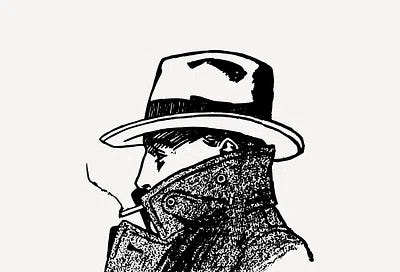Welcome to 2024 and another year of historical sleuthing, as I continue to look at private detectives from history. It never fails to surprise me just how many private detectives there were in Britain in the 19th and early 20th centuries - although, of course, some were more successful than others.
Many private detectives were viewed with suspicion (in some cases, rightly so) - indeed, when William Campbell appeared in court in Liverpool in 1878, newspaper coverage referred to ‘the private detective nuisance’. The suggestion was that individuals such as Campbell, who was accused of stealing a cheque from a local woman - were inherently dodgy characters. Campbell, though, received extra opprobrium for having claimed to be a police detective constable to the woman, when he was actually a private detective (a lesser-respected occupation). Although there was a William Campbell of the right age and nationality working as a police constable in Liverpool in 1851, this appears to have been a different man, and not the Campbell who was in court.
However, Campbell was a long-standing detective, claiming to have been in the business since 1859. He lived at Rodney Street in Liverpool, but had a detective office on South John Street in the city centre - a popular address for people in his line of business.
The census for 1871 records the Irish-born Campbell as a private inquiry officer - a common name for the private detective in Victorian England. The theft he was accused of in 1878 would not have been a habitual or purposeful action by him, for his business would not have lasted if so.
The 1871 census entry for 37 Rokeby Street, Liverpool, showing private detective William Campbell living there with his wife and elderly mother-in-law (TNA/TheGenealogist)
William Campbell was 62 by the time he came before the court. It might have finished his career, for by 1881, the census was recording him as having no occupation (the family income was provided by his wife of 16 years, Mary Ann, who was working as a laundress).
William’s brush with the law appears to have been more of a one-off - a misunderstanding or the result of other people’s suspicion of private detectives - rather than a regular act. Certainly, his long career as a private detective would indicate so. But the way in which his case was described in the press is indicative of how his profession was commonly viewed by the Victorian press.





